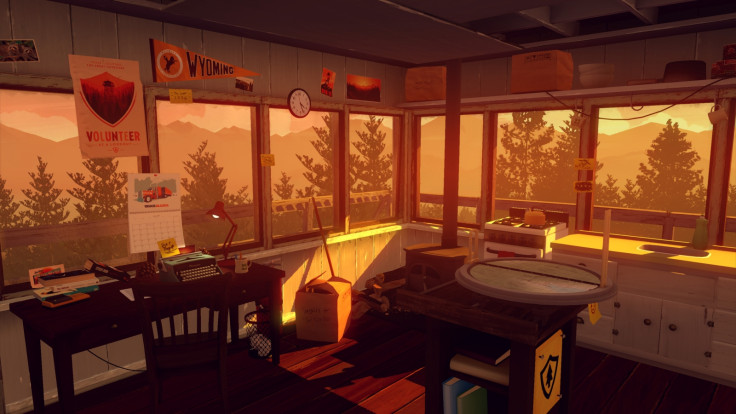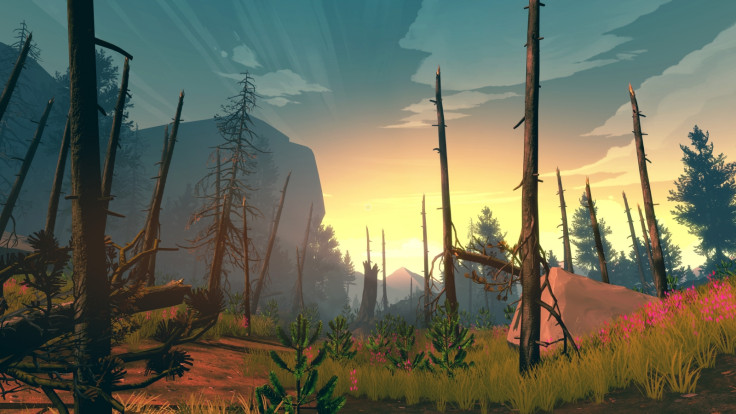How Firewatch masterfully subverted expectations to tell its genuine human story
On how one of the best games of 2016 stood apart.

The following article contains major spoilers for Campo Santo's Firewatch.
A gorgeous landscape is now a smoldering expanse. This Wyoming forest, which stretches for miles all around, can no longer be seen. The once-green horizon is now alight; fire and smoke block out the sun, suffocating, burning, making it clear it's time to leave. You, as Henry, are packing up your belongings, stuffing your typewriter, whisky and notes into your rucksack, and then that ominous beeping begins again. The wave receiver is just begging you to follow it, so you do.
You're standing at the door, everything is packed, all set to go...
Looking down at your desk again before leaving you see it, forgotten and alone, glinting next to a grimy coffee stain: your wedding ring. You stare at it for only a few seconds, but it feels like a lifetime, as everything that has led you to this single moment flashes in front of your eyes. You pick up the ring and are given a choice: put it on, or drop it. What do you do?
Your wife is a million miles away, dementia meaning that in all likelihood she has forgotten your name, maybe even your face – but she is your wife, you love her, you have a life together. Then again, there's that voice at the other end of the radio. A whole wilderness away, a twinkling light on the top of a distant summit. Delilah. You've gone through so much together and have grown so close in such a short space of time. She's funny, daring, interesting, scarred, just like you... do you love her?
Not much focus is given to this little moment – players may even miss it all together – but choosing whether or not Henry puts on his wedding ring is the climactic moment of Campo Santo's Firewatch. It's a split-second choice wrought with so much genuine emotion that it puts most other video game choices to shame.
The act of picking up objects in Firewatch is a mechanic players will have used countless time throughout the game, but never have they had to put so much thought into it. Now the act is significant. It's the culmination of hours spent in the shoes of Henry, learning about him and learning about Delilah through the pair's wonderfully-written conversations.
Firewatch lays out all it needs to at this point to inform whether the player decides to put the wedding ring on or not, but the decision – whether will he stay faithful to his ill wife or hopes for some kind of future with Delilah – isn't one answered for players. It's their decision. It's a decision based on the the what players think about the characters and their journey. One player may choose to put the ring on, another may not, and they're both valid conclusions to reach based what you think Henry might do or what you may do in the same situation.

The way in which no attention is afforded to this moment is an example of how Firewatch excels in subverting the conventions of video game storytelling.
In Firewatch, Henry and Delilah are stalked by a figurative boogeyman as they uncover some kind of secret conspiracy – or so they think. It would have been so easy for the team at Campo Santo to go down the obvious route, and lesser games may have. Just as they so easily could have allowed players to meet Delilah in person at the end. Instead, Firewatch is mature, elegant and refrains from conforming to cliché.
Firewatch instead builds its story on character, and the very real mistakes that we mere mortals make. When Delilah admits to you that she lied to the police about you ever meeting the missing girls, and realises that that lie has been recorded, it's is just one example that a simple exchange between two characters can trump any moment of orchestrated peril.
Thanks to the writing and the fantastic performances of Rich Sommer and Cissy Jones, Henry and Delilah come alive, feeling like real human beings, whose flaws only make them feel more real and relatable.
Likewise the "monster" lurking in the shadows ends up being just another messed up person. Ned Goodwin is someone who suffered severe trauma during war and again later when his young son fell to his death during a forest campaign trip. He may have been unlikable and a bit weird, but he wasn't a villain – he was a man who made mistakes, suffered hardships and has been struggling to deal with them in his own way. He was human.
I'll admit, after I first completed Firewatch I was left feeling a tad underwhelmed. "That's it?" I thought. I was, initially, disappointed that plot threads were left dangling, but with some time I realised just how intelligent Firewatch is.
Walking through its lush meadows and taking photos of the beautiful Wyoming landscape are crucial parts of the Firewatch experience, but what makes the game truly great is how it imbues its mundanities with humanity and emotion. It's in the quaint conversations, awful puns between friends, the sharing of deepest darkest secrets, and something as seemingly simple as deciding whether or not to put on a wedding ring.
For all the latest video game news follow us on Twitter @IBTGamesUK
© Copyright IBTimes 2025. All rights reserved.






















